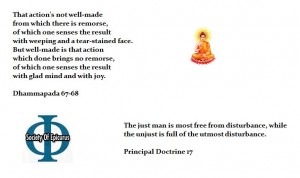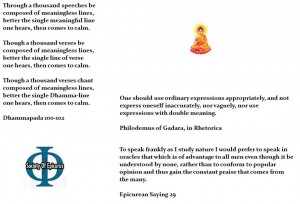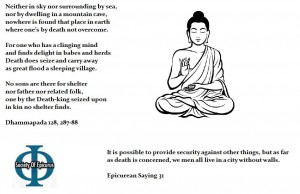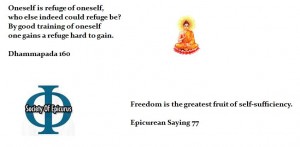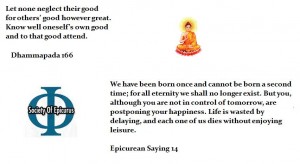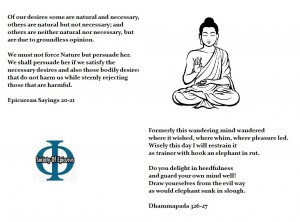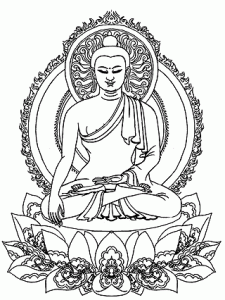1. Sankta kaj nedetruebla estaĵo ne havas malfacilaĵojn nek kreas problemojn por aliaj estaĵoj; do ĝi liberas je kolero kaj partieco, tio implikas malforton.
2. Morto estas nenio al ni; ĉar tio, kio estis solvita en ties elementoj ne spertas sentojn, kaj tio kio ne havas sentojn estas nenio al ni.
3. La grando de plezuro atingas sian limon kiam ĉia doloro estas forigita. Kiam tia plezuro ĉeestas, kiam ajn sen interrompo, neniu doloro ekzistas korpe aŭ mense.
4. Kontinua korpa doloro ne daŭras longe. Kontraŭe, doloro, se ekstrema, daŭras mallongan tempon, kaj eĉ tia nivelo de doloro kiu surkreskas ete la korpan plezuron ne daŭras multajn tagojn. La longtempaj malsanoj permesas troon de korpa plezuro super doloro.
5. Estas neeble vivi agrablan vivon sen vivi saĝe, honore kaj juste, kaj estas neeble vivi saĝe, noble kaj juste sen vivi agrable. Kiam ajn unu el tiuj mankas–ekzemple, se homo ne povas vivi saĝe kvankam li vivas noble aŭ juste–, estas neeble vivi agrablan vivon.
6. Ajna metodo serĉata por protekti sin de aliaj homoj, estas natura bonaĵo.
7. Kelkaj homoj volas famon kaj rangon, pensante ke tiel ili sekuriĝos kontraŭ aliaj homoj. Se la vivo de tiaj homoj vere sekuras, ili akiris naturan bonaĵon. Tamen, se ĝi ne sekuras, ili ne akiris la celon ke la naturo mem origine faris ilin serĉi.
8. Neniu plezuro estas malbona afero en si mem, sed aferoj produktitaj de iaj plezuroj enhavas tumultojn multfoje pligrandajn ol la plezuroj mem.
9. Se ĉia plezuro estus amasigebla, ne nur tratempe sed tra la tuta korpo aŭ almenaŭ tra la plej gravaj partoj de nia naturo, tiam la plezuroj neniam diferencus inter ili.
10. Se la aferoj kiuj plezurigas la homojn senregajn vere liberigus ilin el la mensaj timoj pri la ĉielaj kaj atmosferaj fenomenoj, la timo de morto kaj la timo de doloro; ja, se plue ili instruus al tiuj homoj pri kiel limigi siajn dezirojn, ni neniam devus trovi erarojn en tiaj homoj, ĉar ili tiam estus plezurplenaj el ĉiu fonto kaj neniam havus doloron korpan aŭ mensan, kiu estas la malbonaĵoj.
11. Se ni neniam ĝeniĝus pri la ĉielaj kaj atmosferaj fenomenoj, nek pri’l timo de morto aŭ pri nia nescio de’l limoj de doloroj kaj deziroj, ni ne bezonus sciencon naturan.
12. Estas neeble forigi la timojn pri la plej gravaj aferoj se oni ne konas la naturon de’l aĵoj, sed ankoraŭ donas ian krediton al la mitoj. Do sen studi la naturon ne ekzistas ĝuo de’l pura plezuro.
13. Ne ekzistas avantaĝo en akiri protekton kontraŭ aliaj homoj dum ni alarmiĝas pri la okazaĵoj sub kaj sur la tero, aŭ ĝenerale per ia ajn okazaĵo en la senfina universo.
14. La protekto kontraŭ aliaj homoj, atingitaj iagrade per la povo forpeli kaj per materiala prospero, en ĝia plej pura formo devenas el trankvila vivo for de la homamaso.
15. La riĉeco nature bezonata estas limigita kaj facile havebla; sed la riĉeco volata per vantaj idealoj etendas senfine.
16. Sorto malofte sin intermetas kun la saĝulo; liaj plej grandaj kaj plej altaj interesoj estis, estas kaj estos direktitaj per la rezono dum sia tuta vivo.
17. La justulo estas la plej senĝena, dum la maljustulo esta la plej ĝenplena.
18. La korpa plezuro ne pliiĝas kiam oni forigas mankodoloron; poste ĝi nur subtenas variadon. La limo de la mensplezuro tamen atingeblas kiam oni pripensas tiajn korpajn plezurojn kaj siajn rilatajn emociojn, kiuj kutimis kaŭzi al la menso la plej egajn alarmojn.
19. La tempoj limigita kaj senlima ambaŭ donas egalan kvanton de plezuro, se oni mezuras la limojn de’l plezuro rezone.
20. La karno ricevas kiel senlimaj la limojn de’l plezuro; kaj por ilin postuli oni bezonas senliman tempon. Sed la menso, komprenante la celon kaj limon de la karno, kaj forigante la terurojn pri’l estonteco, havendas kompletan kaj perfektan vivon, kaj oni ne plu bezonas senliman tempon. Tamen, la menso ne rifuzas la plezuron, kaj eĉ kiam cirkonstancoj faras la morton tuja, la menso ne mankas ĝuon de’l plejbonvivo.
21. Tiu kiu komprenas la limojn de’l vivo scias ke estas facile atingi kion forigas la mankodoloron, kaj kompletigas kaj perfektigas la tutan vivon. Tiel oni ne plu necesas l’aĵojn kiuj postulas lukton.
22. Ni devas konsideri la finfinan celon kaj repacigi ĉiujn niajn opiniojn kun la klara sensa evidenteco; alie ĉio estos plena je necerteco kaj konfuzo.
23. Se oni luktas kontraŭ siaj sentoj, oni ne havas normon al kiu rilati, kaj do neniel povas juĝi eĉ tion, kion asertas esti falsa.
24. Se oni malakceptas ajnan percepton sen halti por distingi inter siaj opinioj sur tio, kio jam estis konfirmita kiel ĉeestanta ĉu en emocioj aŭ sentoj aŭ ajna alia apliko de’l intelekto al la prezentoj, oni konfuzas la reston de siaj perceptoj kaŭze de opinioj sen fundamento kaj malakceptas ĉian normon de vero. Se oni rapide konkludas, ke estas konfirmataj la ideoj bazataj je opinio, ĉu oni atendas konfirmon aŭ ne, oni eraros, ĉar oni daŭrigos ĉian kialon por dubo en ĉia juĝo inter la prava kaj malprava opinioj.
25. Se oni ne ĉiam rilatas ĉiajn siajn agojn al la finfina celo establita de’l naturo, sed en siaj decidoj kaj nefaroj elektas alian celon, siaj agoj ne estos konsekvencaj kun siaj teorioj.
26. Ĉiuj deziroj kiuj ne kondukas al doloro kiam ili restas nesataj estas nenecesaj, sed la deziro estas facile forigebla kiam la afero dezirata estas malfacile akirebla aŭ kiam la deziroj ŝajnas kunporti la eblon damaĝi.
27. El ĉiuj rimedoj kiujn akiras la saĝeco por feliĉon certe havi tra la vivo, senkompare la plej grava estas la amikeco.
28. La sama konvinko kiu inspiras konfidon, ke nenio timenda estas eterna aŭ eĉ longdaŭra, ankaŭ montras al ni, ke el la limigitaj malbonoj de tiu ĉi vivo, nenio pli sekurigas nin ol la amikeco.
29. El niaj deziroj, kelkaj estas naturaj kaj necesaj, aliaj estas naturaj sed nenecesaj; kaj aliaj estas nek naturaj nek necesaj, sed estas pro senbazaj opinioj.
30. Tiaj naturaj deziroj kiuj alportas neniun doloron se oni ne satigas ilin, malgraŭ esti serĉataj intenspene, ankaŭ kaŭzatas pro senbazaj opinioj; kaj homoj malsukcesas forigi ilin, ne pernature sed per la opinioj senbazaj de’l homamasoj.
31. Natura justeco estas reciproke utila interkonsento por eviti ke oni estu damaĝata aŭ ke oni damaĝu la aliajn.
32. Tiuj estaĵoj kiuj estas nekapablaj fari interkonsentojn kun aliaj por ne kaŭzi suferadon nek vundiĝi konas nek justecon nek maljustecon; kaj la sama por tiuj kiuj estis nekapablaj aŭ nevolaj eniri en ĉi tiujn interkonsentojn.
33. Neniam ekzistis ia absoluta justeco, nur reciprokaj interkonsentoj inter homoj de malsamaj lokoj kaj tempoj kiuj evitis esti damaĝataj aŭ damaĝi la aliajn.
34. Maljusteco ne estas malbono en si mem, sed nur en konsekvenco de la timo asociita kun esti eltrovota per administrantoj por puni tiajn agojn.
35. Estas neeble por homo kiu sekrete malobservas la kondiĉojn de interkonsento ne damaĝi aŭ esti damaĝitaj, ke li sentu certecon ke li restos neeltrovota, eĉ se li jam eskapis dekmil fojojn; sed eĉ ĝis sia morto oni neniam certiĝos ke oni ne estos detektata.
36. Ĝenerale, la justeco estas la sama por ĉiuj, ĉar ĝi estas bazita sur reciproka avantaĝo en homaj aferoj, sed en sia apliko al apartaj lokoj aŭ cirkonstancoj, la justeco ne nepre estas la sama por ĉiuj.
37. Inter la aĵoj kiujn la leĝo konsideras justaj, ĉio kio estas pruvita avantaĝa en la homaferoj havas la stampon de justeco, ĉu tio estas la sama por ĉiuj; sed se homo faras leĝon kaj ne pruvas ke ĝi reciproke profitas, ĝi ne plu estas justa. Kaj se tio, kio reciproke avantaĝas, varias kaj nur mallonge samas al nia koncepto de justeco, tamen dum tiu tempo estas justa laŭ tiuj kiuj ne sin koncernas kun malplenaj vortoj sed nur rigardas la faktojn.
38. Kie, sen ekzisti ŝanĝo de cirkonstancoj, aperas ke aferoj konsideritaj justaj per la leĝo ne samas al la koncepto de justeco en praktiko, tie tiaj leĝoj ne vere justas; sed kie ajn la leĝoj ĉesis esti avantaĝaj pro ŝanĝo de cirkonstancoj, tiukaze la leĝoj estis justaj dum la tempo ke ili estis reciproke utilaj por la civitanoj, kaj ĉesis esti justaj kiam ili ne plu estis avantaĝaj.
39. La homo kiu plej bone scias alfronti eksterajn minacojn faras familion el ĉiu ajn kiun li eblas familiigi; kaj tiuj, kiuj oni ne povas unuigi al si, oni tamen ne ilin havu kiel fremduloj; kaj kiam oni trovas ke eĉ tio neeblas, oni evitu ĉian kontakton kun ili, kaj dum la tempo kiam tio avantaĝos, ekskludas ilin el sia vivo.
40. Tiuj kiuj havas la povon defendi sin kontraŭ minacoj de siaj najbaroj, havante la plej certan garantion de sekureco, vivas la plej agrablan vivon unu kun aliaj; kaj tia estas sia ĝuo kompleta de intimeco, ke se unu el ili mortas antaŭtempe, la aliaj ne lamentos sian morton kvazaŭ tio postulus domaĝon.

, by Kurt Lampe.



